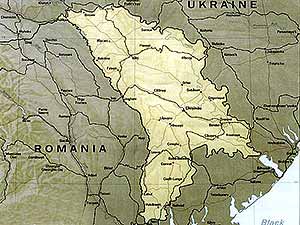December 12, 2007 (the date of publication in Russian)
Alexander Rudakov
KISHINEV COMPLAINS ABOUT PRESSURE FROM BUCHAREST
Pre-war borders to be re-established?
 For a long time, Washington and Brussels shared the view that the only problem of the sovereign republic of Moldova is "Russian imperialism", which prevents Kishinev (Chisinau) from taking the right bank of the Dniester under control. The reality appeared to be more complicated than sundry schemes. Last week, Moldova's President Vladimir Voronin, who used to display loyalty to Western powers and rejected the Russian plan of reconciliation through federalization of the republic, declared that he is going to report to the EU headquarters for insolence of a particular state which "is waging aggression" against his country. This state appeared to be the democratic Romania, presently a member of both the EU and NATO.
For a long time, Washington and Brussels shared the view that the only problem of the sovereign republic of Moldova is "Russian imperialism", which prevents Kishinev (Chisinau) from taking the right bank of the Dniester under control. The reality appeared to be more complicated than sundry schemes. Last week, Moldova's President Vladimir Voronin, who used to display loyalty to Western powers and rejected the Russian plan of reconciliation through federalization of the republic, declared that he is going to report to the EU headquarters for insolence of a particular state which "is waging aggression" against his country. This state appeared to be the democratic Romania, presently a member of both the EU and NATO.
Mr. Voronin admitted he had been tolerating the pressure for years. "We hoped Romania's behavior to change after entering the EU", he sadly stated. "But now, we see we've committed a mistake. Romania has lately become even more aggressive".
It was shocking for Mr. Voronin to find out that the Bucharest officials are going to dispute Moldova's sovereignty, and view the country as an "unlawfully alienated territory".
In late November, Filip Teodorescu, Romania's Ambassador in Kishinev, characterized the 1947 Paris Treaty, establishing Romania's borders as "a falsification of history". He claimed that the document was signed "because Romania at that time was defeated and occupied country" at that time. Teodorescu is convinced that the Paris Peace Treaty is not more legitimate, and can't serve as a juridical substantiation for the existing Romania-Moldova border along the Prut river.
This statement sounded strange, regarding the fact that Romania was not an occupied country by the end of the war. After the pro-Nazi dictator Ion Antonescu was overthrown, Romania joined the anti-Hitler coalition and fought on the Soviet side, deserving later a territorial reward. Romania's new borders included a part of Transylvania, alienated from the country shortly before the war on the decision of international arbitration under the auspices of Nazi Germany. It is noteworthy that after the war, neither the relatively independent leftist dictator Ceausescu nor King Mihai laid claims on Moldova.
Today's Bucharest, however, is driven not by a historical but a political logic. The leading parties of Romania have to look back at the supporters of Great Romania party which demands annexation of not only Moldova but also the Ukrainian territory of Bukovina. Therefore, Romania's intent to dispute legitimacy of Moldova’s independence may severe tensions also with Kiev. The last meeting of Presidents Trajan Basescu and Viktor Yushchenko in November resulted with a hysterical outburst from Ukraine's side, indicating probability of this development.
Viewing the problem from the standpoint of Russian interests, the paradox of an aggressor under aggression (Moldova, in its turn, would like to overtake the presently independent, though unrecognized Republic of Transdniester) may become the key for a radical solution of the Transdniester problem. In case Moldova rejects the Paris Treaty, it won't anyway be able to lay claims on Transdniester. This fact is well understood in Bucharest: in late 2006, President Trajan Basescu, offering Moldova to enter the EU in an alliance, spoke about Dniester as of the future border of the state. In its turn, Transdniester will acquire prefect legal grounds for becoming a part of Russia (this option is supported by an absolute majority of Transdniester's population).
Number of shows: 1336
 ENG
ENG 

 ENG
ENG 
